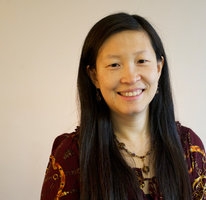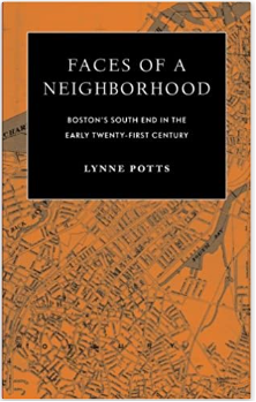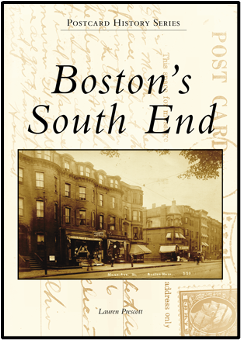
BLOG: APPLIED RESEARCH OF EMMANUEL GOSPEL CENTER
Boston Climate Dialogues: 3 Fall Events
Join us for three Boston climate talks at EGC this fall! Guest speakers include Mia Mansfield, Mariama White-Hammond, Gabriela Boscia, and Melinda Vega. Come learn with us as we become more informed and ready to support local leaders doing important climate resilience work in our neighborhoods and city.
Boston Climate Dialogues: 3 Fall Events
By Ruth Wong
EGC is excited to partner with Northeastern University and Vibrant Boston to promote practical dialogue on climate change and resilience in Boston communities. We are opening three of our fall sessions to the public, to broaden community knowledge and collaboration with Christian leaders engaged in climate resilience work.
ABOUT OUR COLLABORATION
EGC is one of Northeastern University’s Service Learning Opportunity sites, and this fall we are learning alongside students in a Climate Change & Society class, taught by Sociology Professor Sharon Harlan. We are exploring together the possible impacts of climate change in a Boston neighborhood and how the community can become more resilient to environmental change.
Northeastern also has interest in engaging youth and residents from a Boston neighborhood. With our existing collaboration with Vibrant Boston, EGC helped facilitate a three-way partnership for this class.
Vibrant Boston is a free drop-in program based in Boston’s Lenox-Camden neighborhood of the South End /Lower Roxbury area. They provide the youth and their families living in this well-documented high crime community with support, enrichment, and opportunities based in a Social and Emotional Learning approach. Vibrant Boston programming covers a broad spectrum of services, including homework help, sports activities, career exploration, job opportunities for both teens and adults, and therapeutic classes in the arts.
OUR GOALS
Our three-way collaboration seeks to:
empower Vibrant Boston, and the residents of housing developments surrounding it, to learn about the potential impacts of climate change on urban communities, including their own
become more informed about climate change and how we can support Christian leaders’ involvement with the city of Boston’s climate change initiatives
promote a constructive dialogue about resilience within the community, with other communities, and with city government
provide opportunities for Vibrant Boston youth to interact with Northeastern students for mutual learning and relationship-building that are beneficial to both groups.
encourage Vibrant Boston youth’s aspirations for a university education
EGC staff and Vibrant Boston youth will attend eight sessions of the Northeastern Climate Change & Society class to learn and dialogue about climate change and its impact on urban communities.
“Decisions are being made now about climate mitigation and adaptation that affect how people will live in the future climate. There are significant social justice problems involving human capabilities and adaptive responses to climate change that must be addressed at local, national, and global scales. We will examine how communities are striving to adapt and prepare for the climate of the future. - excerpt from the Climate Change & Society course syllabus, Northeastern University
You're Invited!
Three guest speaker sessions are open to the public. We welcome residents from Boston and area churches to participate with us as we hear from key Boston leaders addressing this issue.
Learn with us! Join us in becoming more informed and ready to support local leaders doing important climate resilience work in our neighborhoods and city. Please mark your calendars for these fall events!
1. Is Boston’s Climate Changing? Are We Prepared?
Mia Mansfield
City of Boston Office of Environment, Energy and Open Space
Reading Assignment: Climate Ready Boston Report
Monday, October 23 @ 3:15PM
2. Connections: Race and Climate Justice
Rev. Mariama White-Hammond
Bethel AME Church
Reading Assignment: Bridging Boston’s Racial Divide by Blanding
Monday, October 30 @ 3:15PM
3. Resilient Communities: East Boston Sets an Example
Gabriela Boscio & Melinda Vega
Neighborhood of Affordable Housing, East Boston
Wednesday, November 8 @ 3:15PM
Take Action
RUTH WONG
Ruth is passionate about creating learning communities for churches and leaders across racial, socio-economic, and denominational lines. Director of the Boston Education Collaborative, Ruth collaborates with the Boston Public Schools to foster partnerships between schools and faith-based institutions. Every summer, Ruth also teaches at an engineering program at MIT for high school students.
How Are We Doing?
Top 6 Books For Understanding The South End
The South End has undergone a dramatic transformation in this generation. Christian leaders in the South End can benefit from these recommended resources for foundational and ongoing learning about this dynamic community.
Top 6 Books For Understanding The South End
by Rudy Mitchell, Senior Researcher, Applied Research and Consulting
The South End has undergone a dramatic transformation in this generation. Christian leaders in the South End can benefit from these recommended resources for foundational and ongoing learning about this dynamic community.
The books I've selected are not just informative — they also illustrate methods of researching a neighborhood or community. These methods include historical research, biographical research, the use of documents and photographs, interviews, and participant observation. The books also represent different time periods from the 1890s settlement house research to very recent studies.
Once Upon a Neighborhood: A Timeline and Anecdotal History of the South End of Boston
by Alison Barnet
While Barnet’s history of the South End is not a continuous narrative, it is by far the most detailed study of the neighborhood. The book is arranged chronologically by year, with many years having multiple entries of a paragraph for each fact or anecdote. The history from the 1960s on is especially detailed since the author lived in the South End during that period. This work covers all types of businesses, publications, organizations, and churches. It does an excellent job of covering the rich diversity of groups and individuals which have lived in the South End. Some entries are associated with a founding date or initial activity, but also describe later developments up to the twentieth century. On the other hand anecdotes sometimes also review past history from the associated date. You can dive into this book at any point and find a fascinating mix of people, events and issues from a cross-section of neighborhood life.
Boston’s South End: The Clash of Ideas in a Historic Neighborhood
by Russ Lopez
The South End is a complex neighborhood which has experienced many waves of change. This is the only full length book to narrate and interpret the overall history of this diverse community. Lopez notes some truth in the standard narrative of the neighborhood rising, declining, and gentrifying, but says the fuller story is more multifaceted and nuanced. Since this has been a multi-racial, multi-ethnic neighborhood for over 125 years, it offers many lessons in conflict resolution and community organizing for other urban neighborhoods. The chapter on religion in the South End describes several major institutions, but fails to cover some of the largest Protestant churches. Although the book contains occasional factual errors, it is the most comprehensive history of the South End.
A Block in Time: History of Boston's South End Through a Window on Holyoke Street
by Lynne Potts
See also by the same author, Faces of a Neighborhood: Boston’s South End in the Early Twenty-first Century.
Lynne Potts, a long term resident, writes with flair and adds a personal touch to her concise history of the South End. She also gives those interested in the research process glimpses of her own research methods including trips to archives and libraries as well as detailed first hand observations and interviews. Although the book includes enough general information to understand the neighborhood’s development and trends, its unique contribution is the author’s personal perspectives and experiences woven into the general narrative. The approach of studying a neighborhood beginning with an in-depth look at one typical block works well here because the people, events, and experiences described are representative of the larger neighborhood over the last several decades.
Boston’s South End
by Anthony Mitchell Sammarco
See also by the same author, Boston’s South End: Then and Now.
The Arcadia Images of America Series books are full of historical photos with detailed descriptions and introductions for each of the towns and neighborhoods covered. While these do not give full histories of the communities, they do help the casual reader absorb a visual sense of the history and learn many detailed facts. Photos are organized in chapters about churches, schools, hospitals, businesses, libraries, transportation and other institutions. Many of the photographs show buildings, but quite anumber also include groups of everyday people. By learning about the history of your neighborhood you can join with others interested in history, have common ground for conversations, and gain an understanding of community identity.
Legendary Locals of Boston's South End
by Hope J. Shannon
While a neighborhood like the South End has many historical buildings, its current and past residents are the most interesting and important aspect of what makes it a community. Hope Shannon presents short, illustrated biographies of women and men of the past and recent times who have made significant contributions to the community and wider world. Shannon selects famous, infamous, and everyday people from many walks of life for Legendary Locals. The biographies range from Alexander Graham Bell, Louisa May Alcott, Rev. A.J. Gordon, and Cardinal Richard Cushing to former Mayor James Michael Curley. People who have lived in the South End of Boston over the last several decades will enjoy reading about historical figures and familiar faces, while newer residents and future generations will benefit from the careful research behind all of these biographies.
The City Wilderness: A Settlement Study
by Robert A. Woods, (editor)
In the 1890s the South End House was established as a settlement house, and the residents and associates began living in and researching the neighborhood. This classic book was the result of that research. Although the language and views were shaped by the culture and ideas of that time period, the research opens a window into the lives of South Enders at the turn of the century. The topics covered include history, description of the population, public health, employment, politics, “criminal tendencies,” recreation, the church, education, social agencies and charitable organizations (including an analysis of their methods). The most fascinating elements of the book are three color coded maps indicating for each block, the types of buildings, the nationalities of residents, and the types of employment of the workers. The book can be accessed online at Google books.
Other more specialized books on the South End
South End Character: Speaking Out on Neighborhood Change
by Alison Barnet
While the book Legendary Locals of Boston's South End highlights South Enders who achieved some prominence or fame, in contrast South End Character gives us a window into the lives of the lesser known “old South Enders.” Barnet also contrasts the perspectives and lifestyles of long-time residents and wealthier newcomers. Many of the chapters are reflections and sketches of people and life in the 1960s and 1970s. These short essays originally appeared as columns in the South End News. The look backward is not just a nostalgic reminisce, but an examination of values and issues in a changing neighborhood. Alison Barnet has also written several other books including South End Incident: A True Story.
Faces of a Neighborhood: Boston’s South End in the Early Twenty-first Century
by Lynne Potts
In this second book on the South End, author Lynne Potts interviewed 24 diverse neighborhood residents. The interviews draw out insights on contemporary issues facing people living in the city today. The 24 South Enders included people from different age groups, economic groups, as well as people who were long-time residents and newcomers.
Boston’s South End
by Lauren Prescott
This annotated collection of South End related postcards covers the period from the late 19th century to the mid Twentieth century. This is not a complete history, but it does have extensive notes with its many pictures of South End churches, hospitals, charity organizations, and businesses. For example, the book gives details on Rev. Edgar J. Helms’ development of Morgan Memorial Goodwill Industries, as well as historical notes on the Salvation Army, the Union Rescue Mission, the Woman’s Christian Temperance Union, the YWCA, and the Woman’s Foreign Missionary Society (founded in the South End). Other chapters cover schools and education; hotels and recreation; and businesses and industry.
Villa Victoria: The Transformation of Social Capital in a Boston Barrio
by Mario Luis Small
Villa Victoria has been a national model of community development. This study looks at the relationship of poverty and social capital, finding in Villa Victoria that poorer urban communities are not necessarily lacking in social capital.
Good Neighbors: Gentrifying Diversity in Boston's South End
by Sylvie Tissot, (translated by David Broder and Catherine Romatowski)
A French Marxist’s perspective on gentrification in the South End based on participant observation and interview research in neighborhood associations and networks.
Take Action
Keywords
- #ChurchToo
- 365 Campaign
- ARC Highlights
- ARC Services
- AbNet
- Abolition Network
- Action Guides
- Administration
- Adoption
- Aggressive Procedures
- Andrew Tsou
- Annual Report
- Anti-Gun
- Anti-racism education
- Applied Research
- Applied Research and Consulting
- Ayn DuVoisin
- Balance
- Battered Women
- Berlin
- Bianca Duemling
- Bias
- Biblical Leadership
- Biblical leadership
- Black Church
- Black Church Vitality Project
- Book Recommendations
- Book Reviews
- Book reviews
- Books
- Boston
- Boston 2030
- Boston Church Directory
- Boston Churches
- Boston Education Collaborative
- Boston General
- Boston Globe
- Boston History
- Boston Islamic Center
- Boston Neighborhoods
- Boston Public Schools
- Boston-Berlin
- Brainstorming
- Brazil
- Brazilian
- COVID-19
- CUME
- Cambodian
- Cambodian Church
- Cambridge













































